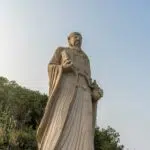Erev Pesach, or simply “The Passover ritual” which is celebrated this year on April 5 is an Israeli national holiday commemorating the feast of the Passover, a celebration of an event that took place in Biblical Israel. It is widely believed to have originated from a ritual that precedes the actual events of the Passover. In those times, to ensure the protection of a family home, an apotropaic rite was conducted where the blood of a slaughtered sheep was smeared on the lintels and doorposts to ward off demonic forces from the house. In the Biblical account, the Passover, the reason for the festival, came to life in Ancient Egypt, preceding the Exodus when God instructed the Israelites to smear lamb’s blood on their lintels and doorposts to spare them from the subsequent killing of all firstborns.
History of Erev Pesach (Israel)
In the Book of Exodus, the Israelites were enslaved in ancient Egypt for up to 400 years. After Yahweh, the god of the Israelites, appeared to Moses in a burning bush, commanding Moses to confront Pharaoh, he decided to show his power by inflicting 10 plagues on the Egyptians. The 10th plague was the killing of all firstborn children in the land. This is recorded in Exodus 11: four to six: “About midnight I will go throughout Egypt. Every firstborn son in Egypt will die, from the firstborn son of Pharaoh, who sits on the throne, to the firstborn of the slave girl, who is at her hand mill, and all the firstborn of the cattle as well. There will be loud wailing throughout Egypt – worse than there has ever been or will be again.”In the build-up to this final plague, Yahweh commanded Moses to have the Israelites mark a lamb’s blood above their doors for them to be passed over when the wave of death swept by. Biblically, the festival observance requires that all leavening be disposed of before the beginning of the 15th of Nisan. At the same time, an unblemished lamb or goat usually referred to as the “Korban Pesach” or “Paschal Lamb,” should be set apart on the 10th Nisan. Then, it should be slaughtered at dusk as 14th Nisan ends in preparation for the 15th of Nisan, at which time it will be eaten after it has been roasted. We must eat all parts of the sacrifice before sunrise on the morning of the 15th of Nisan. If anything is left over by dawn, it must be burned.The biblical requirements for slaying the Paschal lamb in individual Hebrews’ homes and smearing the lamb’s blood on doorposts and lintels were celebrated in Egypt. But once the Israelites were in the wilderness and there was a tabernacle in place, they changed those requirements. The Passover lambs were now sacrificed at the door of the tabernacle as against the homes of the Jews. Therefore, smearing blood on doorways was scrapped.
Erev Pesach (Israel) timeline
Moses, the prophet and pioneer of the emancipation of Israel from Egypt, is born.
Yahweh, God of Israel, appears to Moses through a burning bush and gives him instructions leading to Israel’s exodus from Egypt.
The first Passover festival in the 20th century takes place in March.
The first Erev Pesach of the 21st century is observed and celebrated in April.
Erev Pesach (Israel) FAQs
What is Erev Pesach?
Erev Pesach is an Israeli national holiday commemorating the Passover, which symbolizes an important event in Israel’s history.
When is Erev Pesach?
There is no definite date for Erev Pesach as special calculations are done by Jewish experts who usually determine it. It has primarily occurred in March and April.
How long does the Passover last?
The Passover lasts up to eight days, comprising many different activities.
How to Observe Erev Pesach (Israel)
-
Perform the Passover rites
The most common way to participate in the Passover is to kill and roast a lamb or goat and eat it with others, such as family, friends, or neighbors. It’s a time to celebrate and feast with loved ones.
-
Visit Israel for the Passover
If it is something you can afford to embark on, a journey to Israel for the opportunity of experiencing Passover in its purest form is a good idea. You will be astonished by the natural wonders Israel has to offer.
-
Share on social media
Share pictures and other forms of media of you celebrating Pesach with family and friends on social media, using the #ErevPesach hashtag. Start a conversation with others.
5 Interesting Facts About Passover
-
It is common to play “Four Questions”
At modern Passover celebrations, families play “Four Questions,” in which the answers detail the core values of the feast.
-
Pets are welcome too
Back when the first Passover took place, the Israelites who had pets included them in the Passover meal before taking them along during the Exodus from Egypt.
-
Wine is a Passover staple
It is always common to drink wine at Passover, with four cups of wine usually being poured and consumed during Passover meals.
-
Leavening
Culturally, Jews abstain from leavening during Passover as they were instructed during the very first Passover that Israelites should not eat leavened food as part of the meal.
-
First White House Passover
The first Passover meal at the White House took place in 2009 under the tenure of American President Barack Obama.
Why Erev Pesach (Israel) is Important
-
It is cultural heritage
Passover is a great cultural heritage for Jews. It is a tradition that has been practiced in Israel for thousands of years.
-
It’s a symbol of Yahweh’s deliverance
The Passover symbolizes Yahweh’s deliverance and sparing of the firstborn children of the Israelites during the 10th Plague. It is a holy observance.
-
It marks the beginning of the Exodus
The Passover was the last act that preceded the Exodus of the Israelites from Egypt. That Exodus symbolizes freedom from oppression.
Erev Pesach (Israel) dates
| Year | Date | Day |
|---|---|---|
| 2022 | April 15 | Friday |
| 2023 | April 5 | Wednesday |
| 2024 | April 22 | Monday |
| 2025 | April 12 | Saturday |
| 2026 | April 1 | Wednesday |
































